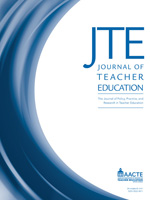17 Jan2014
By Deborah Schussler and Lisa Johnson
The authors are members of AACTE’s topical action group on Teacher Education as a Moral Community. The views expressed in this post do not necessarily reflect the views of AACTE.
A recent National Council on Teacher Quality (NCTQ) report evaluates teacher preparation programs for their attention to an important element of preparation: classroom management. Unfortunately, the report’s few helpful suggestions get lost in the slough of misguided assumptions and questionable claims by the report’s authors.
16 Dec2013
By Jessica Milton

The editors of Go Teach magazine recently turned to AACTE to help prospective teacher candidates navigate the proliferation of conflicting visions of what constitutes effective teacher preparation. In response, my colleague Saroja Barnes and I coauthored an article for the magazine that ran in the November/December issue as the cover story, “How to Choose an Effective Teacher Preparation Program.”
Based on relevant research on teacher preparation, the article points to several key components of high-quality programs that potential teacher candidates should consider. Structured by seven key questions, the article guides prospective candidates to think through the following issues when exploring teacher preparation pathways:
10 Dec2013
By Kristin McCabe

The January/February 2014 issue of the Journal of Teacher Education (JTE) is now available online. See what Volume 65 Number 1 has to offer—without waiting for the mail delivery!
- In this month’s editorial, JTE‘s editors at Penn State University announce the 2014 Editorial Review Board and outline the highlights of this issue’s articles.
- “The Effects of Teacher Entry Portals on Student Achievement” classifies North Carolina public school teachers into 11 predominant “portals” of entry into the profession and estimates their effects on students’ test score gains. The gains are generally higher for students of teachers prepared through in-state, public undergraduate programs—but Teach for America corps members seem to be more effective in STEM subjects and at the secondary level.
05 Dec2013
By Mary Harrill
On December 10, the National Council on Teacher Quality (NCTQ) will release a report on how well educator preparation programs prepare teachers to effectively manage classrooms. The report will include an analysis of 122 programs, judging them based on what NCTQ has identified as the five most important classroom management strategies:
- “Rules: Establish and teach classroom rules to communicate expectations for behavior.
- Routines: Build structure and establish routines to help guide students in a wide variety of situations.
- Praise: Reinforce positive behavior, using praise and other means.
- Misbehavior: Consistently impose consequences for misbehavior.
- Engagement: Foster and maintain student engagement by teaching interesting lessons that include opportunities for active student participation.”
AACTE has no further information about the report at this time, but we’ll keep you posted as we learn more. Information on past NCTQ reviews is available here.
02 Dec2013
By Lisa Johnson Kiefer

A groundbreaking policy guide released today provides state lawmakers and education advocates with a blueprint for practical changes to improve teaching quality in America. The guide recommends policies based on research and state models that have been highly effective in developing and sustaining talented and diverse teaching forces that prepare all students for college, career, and life.
25 Nov2013
By Sarah Pinsky
Last summer in its 2013 Teacher Prep Review, the National Council on Teacher Quality (NCTQ) set forth recommendations for state and local policy makers who want to see the ratings increase for educator preparation programs in their jurisdictions. One of these recommendations was to “revamp current inspections of teacher preparation programs, performed as a condition of program approval.” Positing that neither state program approval site visits nor national accreditor site visits have proven to be meaningful, NCTQ recommended that states employ independent inspectors, along the lines of the British inspectorate model for preparation programs, to conduct program evaluation site visits and program evaluations.
22 Nov2013
By Alicia Ardila-Rey
Good news: A new study shows that transferring highly effective teachers to low-performing elementary schools improves the achievement of students in those schools. The impact of the transferred teachers in this study was greater than the impact of Teach For America (TFA) teachers found in studies with similar student populations.
Mathematica conducted the multisite experimental study, in which highly effective teachers were offered $20,000 over 2 years to transfer into and remain in elementary and middle schools that had low average test scores.
21 Nov2013
By Sharon Robinson and Fayneese Miller
Note: This op-ed was submitted to The New York Times but was not published.
A recent column by Bill Keller in The New York Times, “An Industry of Mediocrity,” highlighted a 2005 report by the well-respected Arthur Levine that concluded that the programs that prepare our nation’s educators “range from inadequate to appalling” and set the premise that the profession is a “contended cartel” of low-quality programs that should “feel threatened.” As leaders of AACTE, we view Mr. Keller’s column not as a threat but as an opportunity to do what we do best: educate.
06 Nov2013
By Sarah Pinsky
In the last couple of weeks, many AACTE members have been contacted by the National Council on Teacher Quality (NCTQ) inviting them to submit new materials by December 15 for the council’s 2014 review of education schools.
Of note in NCTQ’s communication with members is that the 2014 review will be a ranking, rather than a rating, of programs, and that programs that don’t set a minimum GPA entry requirement can meet the selectivity standard by showing that the average GPA of admitted candidates is a 3.3 or higher.
AACTE will continue to support members’ decision-making regarding their engagement with NCTQ and to represent members’ concerns about the organization and the work it produces. Members can find materials, including AACTE’s statement on the release of NCTQ’s 2013 review, in the NCTQ-U.S. News resource section of AACTE’s web site.
11 Jul2013
By Sharon Robinson
The Elementary and Secondary Education Act (ESEA) reauthorization bill known as the Student Success Act (H.R. 5), passed last month in a partisan vote by the U.S. House Education and the Workforce Committee, would have a detrimental impact on the American education system and students’ access to qualified teachers. Of note, this legislation would repeal the national standard requiring teachers to be “highly qualified” in the subjects they teach.









